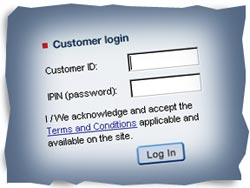
hat can be more convenient than Internet banking?
You log on to the web site of the bank, key in your user ID and password and enter the 'secured' domain of online banking.
Now, do what you want. View the balance in your account, past statements, transfer funds, stop payment on a cheque you  issued, pay bills, request for a cheque book or demand draft. Whatever.
issued, pay bills, request for a cheque book or demand draft. Whatever.
All you need is an Internet connection (and, of course, please don't forget your user ID and password).
Which brings us to the next question: is it safe?
Convenience comes at a risk.
Fraudsters can make your life unsafe and miserable. You could be the victim of a cyber crime in several ways.
Some may steal your user ID and password by an intelligent guess or trying their luck over several attempts.
Others could send cleverly conceived e-mails to deceive you into disclosing your credit card number, bank account details, password and other sensitive details.
More sophisticated attacks involve installing 'spyware' and 'Trojans' (software that spy on what is going on in your PC), through web links and e-mail attachments to collect information from your PC.
Of course, you would not suspect anything wrong.
A hacker could also get to your user ID and password through unauthorised access. To prevent such frauds, most banks that offer online banking facility have adopted 128 bit Secure Socket Layer encryption technology.
This ensures the information exchanged between your computer and the bank's web site is completely protected.
SSL is the universally accepted standard for authenticated and encrypted communication between customers' computers and servers. They also have a firewall, a virtual electronic wall to prevent unauthorised access to the bank's servers, to prevent hackers from hijacking information.
Here are a few tips you can follow:
1. Fraudsters can lure you to enter your user ID and password at a fake web site that resembles your bank.
Always check the URL of your bank's web site. If you see anything other than the bank's genuine URL, you know it isªfake.
Never enter your user ID or password or such sensitive information without ascertaining that you are on the right web site.
2. Check your bank's Internet policy.
Some banks have enhanced security features in Internet banking. For example, if the money that you want transferred to another account exceeds a particular sum, you will need to enter a specific password for high value deals to validate the transaction.
3. Keep changing your password at least once a month. And remember it!
4. Avoid easy-to-guess passwords, like first names, birthdays and telephone numbers. Try to have an alphanumeric
5. Keep your operating system and browser up-to-date with the latest security patches. Install these only from a trusted web site.
6. Always log out when you exit the online banking portal. Close the browser to ensure that your secure session is terminated.
Never exit simply by closing the browser.
7. Install a personal firewall to help prevent hackers from gaining unauthorised access to your home computer, especially if you connect to the Internet through a cable or a DSL modem.
Of course, your anti-virus software should be updated every day.
8. Many banks have a 'last logged in' panel on their web sites.
If your bank has it, check the panel whenever you log in. If you notice irregularities (like you are logging in after two days, but the panel says you logged in that morning!), report the matter at once to the bank and change your password immediately.
9. Don't use the embedded links in any e-mail to get to any web page. Type the link address (URL) in your web browser.
10. Don't open, run, install or use programmes or files obtained from a person or organisation you do not know or from someone who is not a reputed vendor.
11. Don't leave the PC unattended after keying in information while transacting on the web site.
12. Don't fill out forms in e-mail messages that ask for personal financial information, like account or credit card numbers.
13. Don't, in response to any e-mail, provide your online banking user ID, passwords, credit and debit card numbers.
No bank's representative will ever ask for your user ID/ credit or debit card number/ password in any form. If they do, change the bank!
14. Don't select the option on browser that stores or retains user name and password (ie Auto Complete).
15. If you have several bank accounts, avoid using the same online banking password for all.
16. Avoid accessing the Internet banking channel at cyber cafes, which are prone to attacks by hackers. Also avoid locations that offer online connections through wireless networks (Wi-Fi), where privacy and security are minimal.
Remember, your bank expects you to take the minimal precautions while banking online.
If you incur a loss because of negligence, you may not be able to claim any damages from the bank, howsoever faulty the bank's online portal is.
It is easy to slip up on precautions in the glamorous online environment. Take care!





